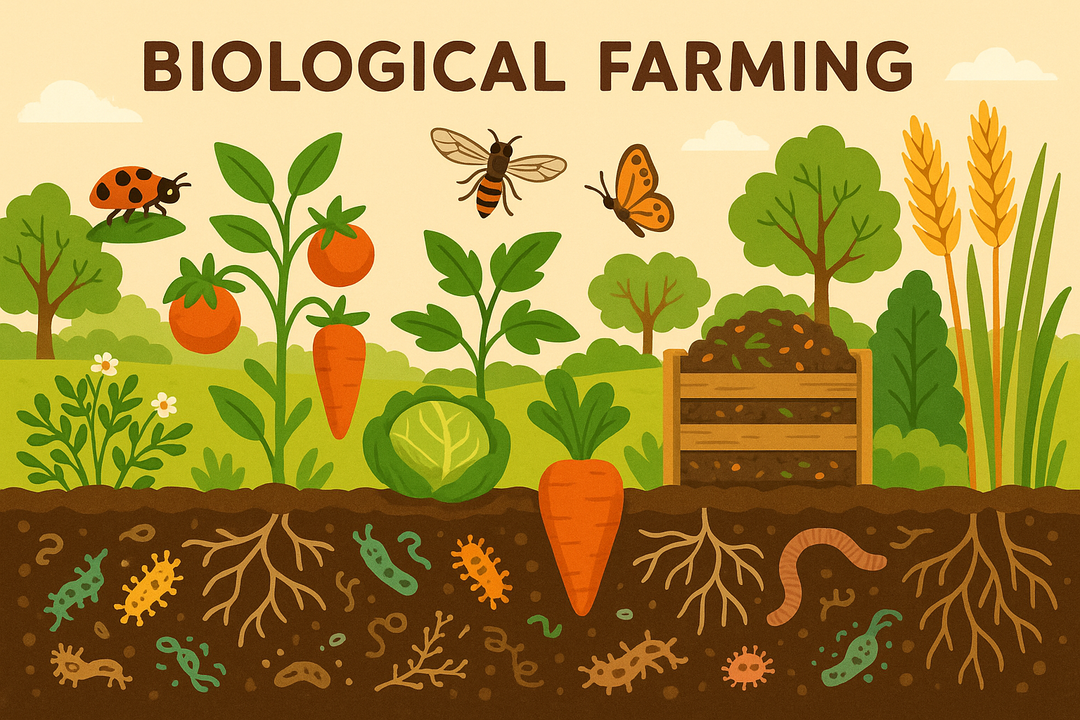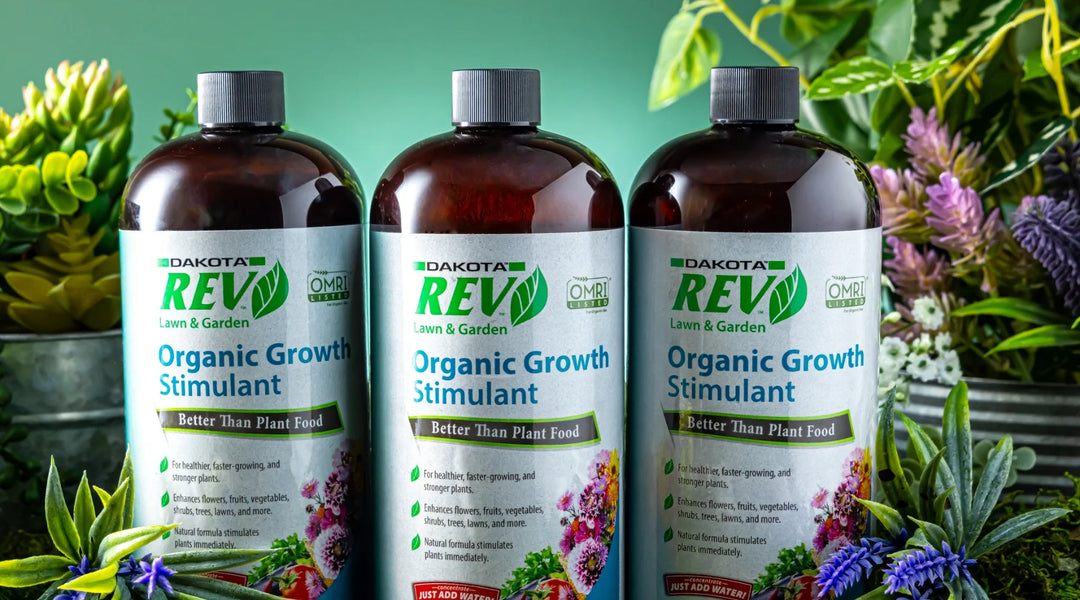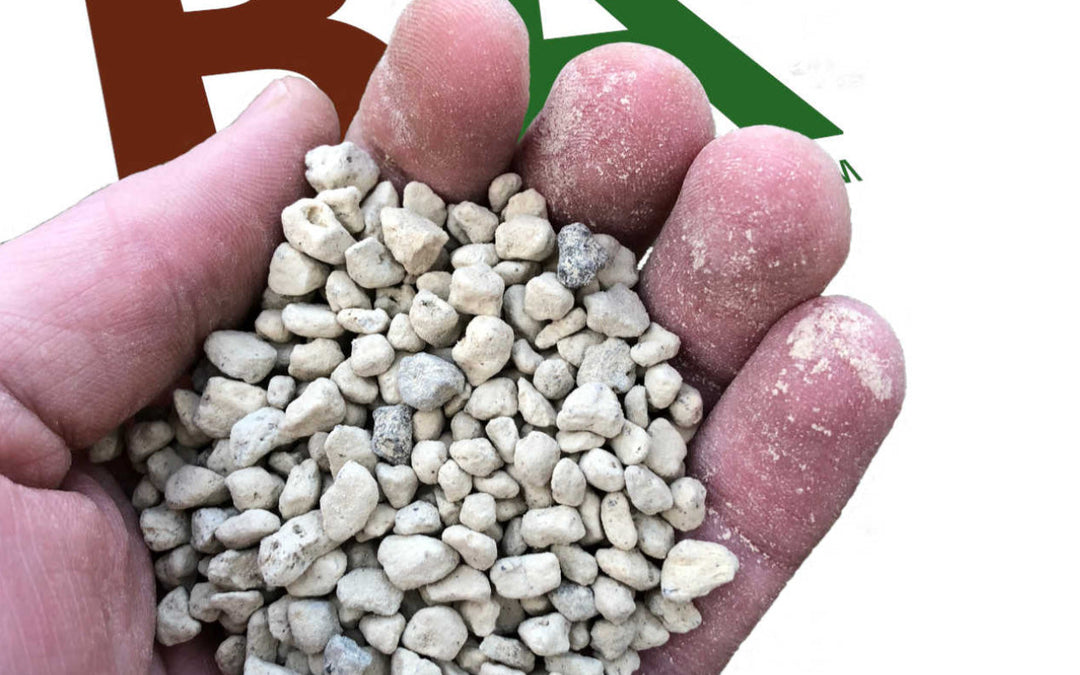Everything You Need to Know About Organic Fertilizers
For many people, gardening is a way to relax, grow their own food, and find a fun and productive hobby. However, gardening and agriculture have a much larger importance to our world, climate, and environment as a whole.
While some fertilizers are made up of chemicals and other substances that may do more harm than good, organic fertilizer is a great way to supplement the growth of your plants without worrying about your impact on the environment. We'll share everything you need to know about supplementing your soil with organic fertilizers, including the different types, what they’re made of, how to add lawn fertilizer to your grass, and the advantages and disadvantages of every situation.
What is Organic Matter?
The first step in choosing an organic fertilizer is to understand the organic matter. Organic matter is found within soil, water, and other environments and consists of carbon-based material. There are three different levels of organic matter:
- Living, also known as living organisms
- Dead, also known as fresh residues
- Very dead, also known as well-decomposed residues
The living portion is made up of microbiological organisms, including compost, plant roots, manure, residue, etc. Dead organic matter is made up of the remnants of these products and the matter that is created as they decompose. The final level is very dead organic matter, also known as soil humus.
What is Organic Fertilizer?
Organic fertilizers are made from organic matter and are a much safer alternative to chemical soil and lawn fertilizers. These products are sometimes referred to as farm manure and can include different plant and animal byproducts. These fertilizers do several great things for your soil, including:
- Help reduce problems associated with chemical fertilizers
- Provide nutrients that are more consistently available, reducing the need for the frequent addition of chemical fertilizers
- Increase soil nutrients and provide energy to soil microbes, which boosts crop growth and improves the overall structure of the soil
Top Types of Animal-Based Organic Fertilizers:
- Blood meal
- Animal manure (cow, chicken etc.)
- Bone meal
- Fish emulsion / hydrolysate
- Fish meal
- Shellfish
Blood Meal Fertilizer
Blood meal is a type of fertilizer made from dried animal blood. This fertilizer can help increase a plant's nitrogen content, which boosts vegetative growth. Although this type of lawn fertilizer is helpful, be careful not to overuse it as it can cause the plant root to burn if it is over-applied and is not the best for animals.
Animal Manure as Fertilizer
Organic fertilizer made from animal manure is versatile and can be sourced from multiple types of animals. However, each animal's manure has different benefits, so it's essential to research what type of soil or lawn fertilizer you need before your first application.
For example, excrement from seabirds is an excellent choice for lawn fertilizer because of its ability to control roundworms - also known as nematodes - and act as a natural fungicide. On the other hand, cow manure can help increase the air penetration of the soil, control weeds, and help increase the soil's ability to retain moisture.
Fertilizing with Bone Meal

As the name suggests, bone meal is made from pulverized animal bones. This type of organic fertilizer can help flowers grow, promote the growth of seedlings, and increase overall production by supplying high levels of phosphorus, calcium, and a little bit of nitrogen.
Fish Emulsion/Hydrolysate Fertilizers
There's nothing fishy about this lawn fertilizer! Fish emulsion is a fancy way of saying decomposed fish parts with a few changes. Once the fish has been cleaned and the edible portions removed, the leftovers are subjected to high temperatures. Oils and protein are removed from the resulting mixture, the substance is mixed with phosphoric and sulphuric acid for stability. Fish Hydrolysate is a better choice than fish emulsion as it is not subject to high temperatures that can degrade the oils and proteins.
Gardeners can use this animal-based organic fertilizer as a soil conditioner and provide a boost of nitrogen. However, you should be careful to avoid overuse, as the high acidity of fish emulsion fertilizer can burn your lawn and garden if you are in highly acidic soils.
Fertilizing with Fish Meal
Similar to a fish emulsion, fish meal is also made from fish waste and contains the protein that is removed during the creation of fish emulsion. For this organic fertilizer, rancid oils are removed, different preservatives are added, and the resulting mixture is used to add phosphorus, nitrogen, and calcium to increase plant fertility, improve the health of your soil, and help plants succeed.
Shellfish as Fertilizer
For a boost of calcium and phosphorus, shellfish fertilizer is a great choice. This organic fertilizer is made from the bones and broken shells of crabs and other shellfish. In addition, the presence of chitin helps repel some pests while promoting root growth and flowering.
Organic Fertilizers Made from Plants:
- Compost
- Soybean and alfalfa meal
- Cottonseed meal
- Kelp meal and seaweed
Fertilizing with Compost
You've probably heard of composting as an environmentally friendly way to reduce the amount of garbage you create. If you're into gardening, it's also an excellent organic fertilizer. Farmers and gardeners can use compost to increase organic matter, promote soil fertility, and provide much-needed nutrients. Just remember, source your compost from a trusted supplier. Ask for compost reports that disclose if there are any chemicals. If making your own compost, use high quality inputs for the best results. Compost is only as good as the inputs you use choose your supplier and inputs wisely!
Soybean and Alfalfa Meal Fertilizers
Most fertilizers aren't meant to be one-stop shops for everything your soil needs. Soybean and alfalfa meal is an additive that contains phosphorus and nitrogen with a neutral pH that helps extend the results of other soil additives.
Using Cottonseed Meal as Fertilizer
This material is known for its nitrogen content and is typically used to cover garden soil. Cottonseed meal provides a mix of slow-release nutrients, including potash, nitrogen, and phosphorus, as well as organic matter and other elements in lower concentrations. Cottonseed meal is a fantastic choice if you're looking for an excellent organic lawn fertilizer.
Kelp Meal and Seaweed Fertilizer
Soils that lack iron and zinc can benefit from the addition of seaweed. This organic fertilizer releases its nutrients quickly and is a good choice for crops that require higher amounts of potassium, also known as high-potash crops.
Organic Mineral Fertilizer Types:
- Rock phosphate
- Greensand
- Montmorillonite Clay
Rock Phosphate Fertilizers
This mineral contains over 30 percent phosphate and high amounts of other trace micronutrients. Rock phosphate is sourced from clay and mineral rocks and is used to boost plant seedling growth and soil acidity.
Fertilizing with Greensand
Greensand is a sandstone high in potassium, iron, and magnesium. By loosening the soil and increasing the water content, greensand is beneficial in increasing the number of flowers and fruit produced by fruit trees.
Fertilizing with Montmorillonite Clay
Developed through intensive sedimentation of marine organisms such as seaweed, shrimp, and algae, this form offers an unrivaled combination of organic minerals for maximum absorption and delivery to your valuable crops. Contains 78 chelated trace minerals.
Why Use Organic Fertilizer?
If you ask farmers and gardeners whether they prefer synthetic or organic fertilizer, chances are most will opt for natural options over artificial ones in most situations. Although there are some instances where a synthetic fertilizer may be preferable, choosing organic solutions is going to be your best bet most of the time. Read on for the main advantages - and a few disadvantages - of using organic soil and lawn fertilizer.
Main Advantages of Organic Soil and Lawn Fertilizer:
- Naturally supports plant health
- Environmentally friendly and doesn't require chemicals
- Helps balance the soil ecosystem
- Less likely to over-fertilize
- Improves soil structure
- Prevents pests naturally

3 Disadvantages of Organic Fertilizers:
- Can be inconsistent if you don't do your research correctly
- Requires patience for long-term results
- Typically, more expensive than synthetic soil and lawn fertilizers
Reasons You Should Use Organic Fertilizer
An organic soil and lawn fertilizer is the obvious choice for those looking to improve their crops or gardens. These soil additions contain natural ingredients such as organic matter, nitrogen, carbon, potassium, and phosphorus that help fuel microbes and increase plant growth.
Organic soil and lawn fertilizers are safe for pets, people, and the environment, so you don't have to worry about potentially harmful chemicals being tracked through your home, ending up on your plants or edible crops, or washing away and contaminating the local water supply. They can also better withstand heavy rains and aid soil in retaining moisture better than chemical fertilizers.

Healthy soil is the foundation of a healthy environment. Organic soil and lawn fertilizers help balance the soil's nutrients while providing the proper support for your plants - not too little or too much. Adding organic fertilizer to soil also helps with nutrient and water retention, which continues to boost the effects of the fertilizer on the plants within the soil long after the initial application.
Another reason we love organic lawn fertilizer is that it offers support to other areas of your home and lawn outside of your crops or garden. For example, while you may have needed bug spray and other lawn treatments in the past to keep pesky bugs away from your crops, many organic fertilizers repel pests and other unwanted insects naturally without the need for insect repellents or other chemical treatments. This can help make your yard a happier place to spend time in and reduce the cost of supplies you're paying for other products.
Reasons to Avoid Organic Lawn Fertilizer
Some of the reasons that people avoid organic lawn fertilizers and other plant growth supplements are because of the price, the time commitment, and inconsistencies across different products. On the surface, these may seem like make-or-break issues. However, you should consider a few points before making a definitive choice based on one of these factors.
Are Organic Soil and Lawn Fertilizers Expensive?
If you only look at the short term, organic plant and lawn fertilizers are more expensive than synthetic ones. However, it's a bit more complicated than that. Although it may seem like a deterrent on the surface, it's essential to consider all the benefits of choosing organic soil and lawn fertilizer over synthetic options.

While synthetic fertilizers are less expensive, they don't maintain the level of quality soil that their organic counterparts do. This means that you will be on the hook for continuously adding synthetic fertilizer to your soil for a longer time, which will add up financially. Making an investment in supplying your soil with the best nutrients via organic fertilizer will pay off in the long run.
How Long Until Organic Fertilizer Works?
Another reason that some people may opt for synthetic fertilizer is for the more-instant gratification that it provides. Organic soil and lawn fertilizers take a bit of time to provide the results you may see more quickly in synthetic choices, but that doesn't mean that it isn't working. Synthetic fertilizer is a sprint, while organic is more of a marathon.
Consistent Organic Fertilizer
The final aspect that some people consider a con of organic soil and lawn fertilizer is that it can be inconsistent in terms of results. This can be caused by poorly researched or created products, which is a problem that is fairly easy to avoid.
If you want to enjoy consistent results, this can be accomplished by choosing a product that has been researched, tested, and recommended by others in your industry. For example, Rocky Mountain BioAg® has a history of working with leading experts, scientists, and biologists, helping create the best products possible that allow its customers to reach their goals.
The Best Organic Fertilizer
When it comes to providing nutrients for your plants, finding the best organic soil and lawn fertilizer comes down to what is suitable for your situation. Take into consideration the type of crops you're planting, the desired outcome, what nutrients your soil may be lacking, and whether there are other areas that you want to focus on.
Some points to consider are the current health of your soil, any pests or insect activity, the type of plants or crops that you plan on growing, and how much work you want to put into upkeep. There are liquid and granular options, and Rocky Mountain BioAg® even has the professional sprayers and soil testing supplies to make sure you get the exact nutrition your soil needs.
Once you've narrowed down your needs, look for an organic option that meets the criteria - or a combination of products. The team at Rocky Mountain BioAg® is on hand to help create the right solution for your needs, whether that means helping you find the best combination or sizing a bundle up or down for you. When you're ready to invest in the soil and lawn fertilizer your plants deserve, we're here for you!












Leave a comment